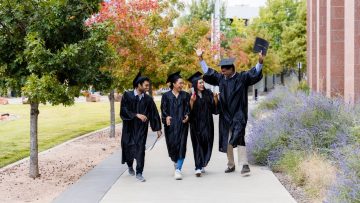Is College Preparing You for Real Life?
Reviewed and edited by Tyson Schritter : 25 May, 2024
Many of today’s students report that their college prep experience did not adequately prepare them for life after graduation. They expect to use their degrees to find jobs in their chosen career paths. However, they often feel dissatisfied with their employment outcomes after graduation.
Survey Results:
According to a survey by McGraw-Hill Education, only 40% of college seniors feel prepared to pursue a career after they receive their degree.
Most students across majors recognize the need for internships and experiential learning. They also value career services, job market training, and professional networking opportunities.
In fact, 71% of students view career planning as an “extremely important” aspect of their college prep. They need more help identifying transferable skills and promoting themselves to employers.
They reported a need for greater assistance in identifying transferable skills from their majors and promoting themselves to potential employers.
How High-Impact Practices Prepare Students for Life After Graduation
We can better prepare students by implementing “high-impact practices” in the college curriculum. These practices involve in-depth academic inquiry, collaborative learning, and experiential education.
The first—and, possibly, the most significant—way we can better help our students is by implementing number of “high-impact practices” into the college curriculum. These practices are a variety of educational opportunities that involve in-depth academic inquiry, collaborative learning, and experiential education.
Many administrators and faculty recognize the limitations of lecture-based learning. They work to create enhanced academic experiences. These programs include first-year experiences, service-learning, capstone projects, hands-on research, study abroad, and internships. High-impact practices teach students teamwork, leadership skills, and the application of classroom learning to real-life problems.
The goal is to create well-rounded graduates ready to face 21st-century challenges.
Importance of Internships
Internships offer the most noticeable benefits for students preparing for new careers. These programs take students off campus and give them real-life experience in their chosen fields. Internships contrast with the more stagnant lectures within the classroom.
Students apply for internships at private companies or nonprofit organizations. They do part-time work while continuing their classes. Some students work in co-ops, taking a full semester off to work full-time. Regardless of the program, students get practical training and guidance from professional mentors.
Interns gain practical work experience and learn about their intended profession. They network with potential future employers. Many students leverage their internships and co-ops into full-time careers.
As the job market tightens, employers don’t want to take chances with untested graduates. Having at least one internship or co-op experience in college can improve a student’s chances of getting hired.
In fact, as reported by the National Association of Colleges and Employers (NACE) in 2015, 56% of students who had an internship or co-op received job offers upon graduation in contrast to 36% of students without internships.
The Type of Education Matters
There’s little question that internships are critical to improve students’ chances in the job market. However, graduates’ ongoing success also depends on their ability to adapt to changing professions as well as to function within an increasingly global and technological society.
In 2015, the Roosevelt Institute in New York published “Creative Schools for a Thriving Economy,” a document in which it is argued that schools should teach creativity instead of “routine cognitive skills.”
This research reinforces my own belief that we need to change the fundamental nature of higher education itself. By pursuing an education that incorporates such high-impact practices as writing-intensive classes, research, and capstone projects that incorporate the entirety of a student’s academic career, college students can learn how to synthesize a variety of different information. They interact with people from different cultures through service-learning and study abroad, teaching them to consider and appreciate diverse perspectives. And through collaborative courses, first-year experiences, and learning communities, they learn how to work with others in a creative effort to solve problems with an interdisciplinary approach.
How Can College Students Become Better Prepared?
It’s no longer enough to attend classes and get good grades. Instead, college students should consider what kinds of extracurricular, interactive, and hands-on experiences their universities offer, taking advantage of programs that promote truly interactive learning. Education beyond the classroom is key, and prospective college students should choose schools with a consideration not just of the campus culture, but also of the out-of-the-box opportunities they provide.
For all college students, it’s imperative to communicate effectively and work collaboratively. All should take advantage of communities and initiatives that challenge them to be intellectually and socially successful.
By encouraging students to be active participants in their degrees, as by reimagining college education itself, we can better prepare our students for the demanding world that awaits them beyond their undergraduate careers.
According to a survey by McGraw-Hill Education, only 40% of college seniors feel prepared to pursue a career after they receive their degree.
In contrast to the lacking resources and experiences that are most often offered at schools around the nation. McGraw-Hill’s research shows that the majority of students across majors recognize the need for internships and other experiential learning, the opportunity to take advantage of career services and training for the job market, and professional networking opportunities while in college.
In fact, 71% of students in their survey view the kind of career planning that is commonly overlooked as an “extremely important” aspect of their college education. They reported a need for greater assistance in identifying transferable skills from their majors and promoting themselves to potential employers.
How High-Impact Practices Prepare Students for Life After Graduation
While I’m frustrated by the results of the McGraw-Hill survey, I’m here to tell you that it doesn’t have to be this way. In such an increasingly competitive job market, there are things we can do to prepare the next generation to enter the workforce and have successful careers.
The first—and, possibly, the most significant—way we can better help our students is by implementing number of “high-impact practices” into the college curriculum. These practices are a variety of educational opportunities that involve in-depth academic inquiry, collaborative learning, and experiential education.
Many administrators and faculty have already recognized the limitations of lecture-based learning and continually work to create enhanced academic experiences for the undergraduates on their campuses. These programs may include first-year experiences, service-learning, capstone projects, hands-on research, study abroad, and internships. It is with high-impact practices like these that allow students to learn the value of teamwork, develop leadership skills, and apply classroom learning to real-life problems.
The goal is ultimately to create more well-rounded graduates who are better trained to face the challenges of a 21st-century world.
Importance of Internships
When we consider the needs of students who are preparing for new careers, internships have the most noticeable benefit.
Internships (as well as cooperative education, or co-ops) may have been around for decades, but they weren’t ever high priorities for many academic institutions that otherwise focused their resources on classroom learning.
Internship programs take students off campus, giving them real-life experience in their chosen career field to contrast their more stagnant lectures within the classroom. To gain temporary, highly useful job experience, students apply for internships at private companies or nonprofit organizations to do part-time work as they continue to take classes. Or, by working in co-ops, students can take a full semester off to work on a full-time basis. Regardless of program, students who participate get practical training and guidance from professional, hands-on mentors.
Interns not only receive practical work experience, but they also gain opportunities to learn more about their intended profession while networking with others who may even be their future employers. As a result of their experiences and new connections, many students can leverage their internships and co-ops into full-time careers.
As the job market tightens up, employers don’t want to take chances with untested college graduates. Having at least one internship or co-op experience while in college can dramatically improve a student’s chances of getting hired. In fact, as reported by the National Association of Colleges and Employers (NACE) in 2015, 56% of students who had an internship or co-op received job offers upon graduation in contrast to 36% of students without internships.
The Type of Education Matters
There’s little question that internships are critical to improve students’ chances in the job market. However, graduates’ ongoing success also depends on their ability to adapt to changing professions as well as to function within an increasingly global and technological society.
In 2015, the Roosevelt Institute in New York published “Creative Schools for a Thriving Economy,” a document in which it is argued that schools should teach creativity instead of “routine cognitive skills.”
This research reinforces my own belief that we need to change the fundamental nature of higher education itself. By pursuing an education that incorporates such high-impact practices as writing-intensive classes, research, and capstone projects that incorporate the entirety of a student’s academic career, college students can learn how to synthesize a variety of different information. They interact with people from different cultures through service-learning and study abroad, teaching them to consider and appreciate diverse perspectives. And through collaborative courses, first-year experiences, and learning communities, they learn how to work with others in a creative effort to solve problems with an interdisciplinary approach.
How Can College Students Become Better Prepared?
It’s no longer enough to attend classes and get good grades. Instead, college students should consider what kinds of extracurricular, interactive, and hands-on experiences their universities offer, taking advantage of programs that promote truly interactive learning.
Education beyond the classroom is key, and prospective college students should choose schools with a consideration not just of the campus culture, but also of the out-of-the-box opportunities they provide.
For all college students, it’s imperative to communicate effectively and work collaboratively. All should take advantage of communities and initiatives that challenge them to be intellectually and socially successful.
By encouraging students to be active participants in their degrees, as by reimagining college education itself, we can better prepare our students for the demanding world that awaits them beyond their undergraduate careers.




